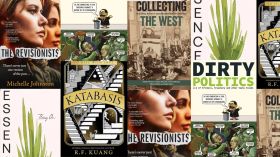Phillipa McGuinness takes a retrospective view of the future of books. Image supplied.
The first time I went to the Frankfurt Book Fair in 2008, I had an appointment with Google. Its stand in Hall Eight was a shiny white pod with no retractable banners or cheap shelving in sight. The pod made a perfect background for the primary colours of Google’s then-serif logo set out on its outer shell.
Hall Eight was the English-language hall, though perhaps there were replica Google pods in all the other halls; they felt, even then, omnipresent. At our meeting inside the pod I remember talking about the Google Preview function, of which NewSouth Publishing, my employer then and now, was an early adopter.
Analogue babes in the digital woods, my colleague Nella Soeterboek and I also discussed the Google Books Library Project, about which we were far more ambivalent. That Google wanted to digitise every book ever published didn’t seem like a utopian vision to us. It was more of a statement of intent, the intent being to take over the world.
Meeting done, I stepped out of the pod with my free Google-branded USB stick and an invitation to arrange a follow-up meeting with a software engineer in case ‘I had any coding questions’. If this sounds now like a euphemism for something else, it did then too. The engineer’s name was Avi, and he seemed more like a Bollywood film star than an emerging Silicon Valley IT genius. He may have been both. If I were casting someone whose job was to appeal to women in publishing with no coding knowledge, he would have won the part.
Google was ten years old and already the search engine nonpareil. In 2008, its search engine supremacy was longstanding – in digital years at least. Even then, its advertising revenues may have been higher than the revenue from books published by most of the Hall Eight exhibitors. Combined. I doubt I realised that day in the pod that Google had already entered its second act and was much more than a search engine. It already owned YouTube, for example.

Cover detail from Griffith Review 64: The New Disruptors. Image credit: Nell, Made in the dark – bolt.
I haven’t made the trek to the Frankfurt Book Fair for a few years, because I disrupted myself by writing my own book. The fair now brands itself as ‘a marketplace for printed and digital content’. Google’s mission to dominate the world of search and beyond has been accomplished. It is so big that it has a parent company called Alphabet that would seem to own all the letters.
But Google still exhibits at Frankfurt. In 2018, the corporation’s main purpose at the Frankfurt Book Fair, according to the brief descriptions in the published list of exhibitors, was to promote Google Play, e-books (and music, TV, magazines, games and film) that are aimed at ‘one billion Android users’.
Amazon’s Kindle had been launched the year before my first Frankfurt, and the new reading device was the talk of the fair in 2008. The tone of this chatter oscillated between excitement and fear. The number of Kindles that the company had shipped prompted some attendees to talk about the end of printed books.
Most of the Amazon warehouses across the world would now dwarf Hall Eight, with its 30,000 square metres of display space. The hall feels vast when you’re inside, bolting to your next appointment. But it’s not so huge alongside the average Amazon warehouse, where floorspace – not all taken up by books of course – is around five times that size.
If Amazon’s impact on the publishing industry were to be reflected in the size of its Frankfurt Book Fair presence, it would need to take up a whole Hall Eight and colonise a few of the surrounding halls too. But it, too, has disrupted its own mission in Frankfurt and it now seems to be about wooing Germans to Amazon Publishing. Frankfurt 2018 had a dedicated audiobook conference, audiobooks being a growing part of publishing now. Audible, owned by Amazon, is the world’s largest audiobook company.
Since my visit to Frankfurt more than a decade ago, big tech has taken over the world. The only company more valuable than Amazon is Apple. Alphabet (Google) is not far behind. These three monoliths were in the mix back then, but other players have since risen. And risen. Facebook had a million users in 2008 (I wasn’t one of them then, but I was the proud owner of a Blackberry and an iPod). Netflix was a DVD mailing service.
Since my visit to Frankfurt more than a decade ago, big tech has taken over the world.
Back then, retail power was equated with size. Not the size of your online e-retailing platform, but the size of your glass-fronted, fully staffed and stocked store. There were enormous bookshops in suburban malls. Other bookstores paid high rent in city-centre retail precincts, as well as high-street shops patronised by locals who felt loyalty and affection to their booksellers but who, it turned out, were as interested in discounts as anyone else. As the world became digital, these superstores – and in fact all bookshops – were described as ‘bricks-and-mortar’.
The description seemed weird to me at the time, but now, of course, I use it without thinking twice. Big-box stores like Borders spread over many floors and displayed thousands of titles, many impossible to find even when staff knew they were there. Somewhere. Most had a Starbucks café as well. You could almost live in these stores, and anecdotes suggested that many homeless people tried to.
Big W and Kmart also started selling books in higher quantities, usually with higher discounts, fittingly, given their retail category is Discount Department Stores. Select stores within the well-established Australian bookselling chain Collins acquired the prefix ‘Super’. Another bookselling chain that carried a weight of history, Angus & Robertson, became A&R Whitcoulls. It went on to buy the Australian, New Zealand and Singapore Borders stores, and all these bookstores formed REDgroup Retail.
In 2011, which also happens to be the year it collapsed, REDgroup accounted for a fifth of Australia’s $1.6-billion-dollar book market. Its stores sold mainly printed books, as well as gifts, calendars, magazines, stationary, CDs and DVDs. They sold Kobo readers too, perhaps inspired by the way in which Barnes and Noble had focused on a single device, the Nook, in the US. But it did not seem to be a winning strategy.
In a case not of causation – my own memories, fortified by a cursory revisit of REDgroup management practices, confirm the path of doom that it was on – but of correlation, the company collapsed within a year of Apple launching iBooks.
I imagine that many people who shopped in Borders haven’t had a caramel mocha frappuccino since then.
This is an extract from Phillipa McGuiness’ essay, ‘When big tech met books’, republished with permission from Griffith Review 64: The New Disruptors (Text), ed Ashley Hay






